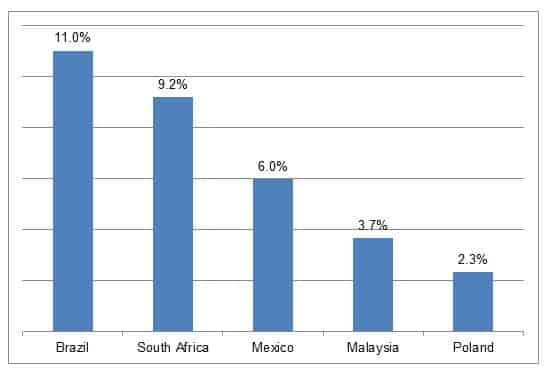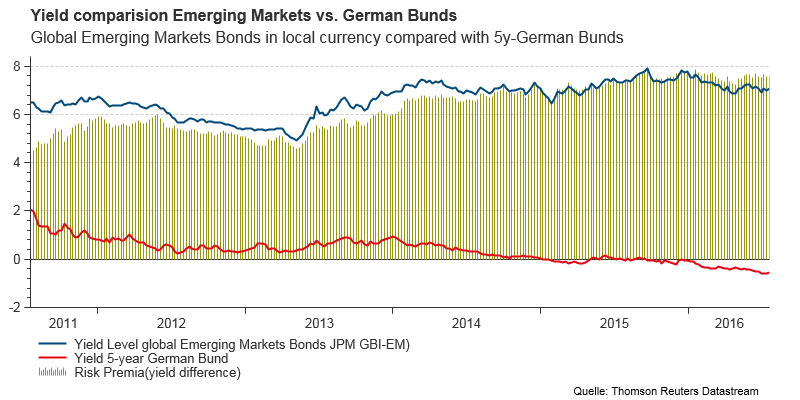Interview with Christian Gaier, Senior Fund Manager for emerging markets government bonds
Emerging equity and bond funds have borne the brunt of the consequences of the global uncertainties in the past years. Wars and conflicts in the region, slumping commodity prices (especially oil), and fears of an interest rate reversal in the USA have caused many investors to withdraw their capital and “park” it in safe havens. Now signs are indicating that investors have been staging a comeback.

Christian Gaier, senior fund manager of government bonds of emerging markets
What is the focus of this fund?
ESPA BOND LOCAL EMERGING invests mainly in emerging markets bonds denominated in local currency; for example, Indonesian government bonds in Indonesian rupiah or Brazilian government bonds in Brazilian real. We also hold Hungarian government bonds, issued in forint. The fund holds more than one hundred bonds from emerging markets issuers from all over the world. The performance of the fund consists of an interest component (local currency bond) and a currency component (changes of the local currency relative to the euro).
Bond yield of selected issue countries in local currency
 Source: JP Morgan; as of 30 June 2016; the chart shows the yield levels prior to fees and taxes; caveat: the ratio “yield” is an inadequate estimate for the future performance of this fund, given that on top of the development of the interest rate, the development of the local currency vis-à-vis the euro plays an important role with regard to the performance.
Source: JP Morgan; as of 30 June 2016; the chart shows the yield levels prior to fees and taxes; caveat: the ratio “yield” is an inadequate estimate for the future performance of this fund, given that on top of the development of the interest rate, the development of the local currency vis-à-vis the euro plays an important role with regard to the performance.
Is the period of unsteady markets coming to an end?
The unsteady period has been reflected in the capital markets. In the past five years, there have been years of extensive corrections, especially in 2013 (-14.1%) and in 2015 (-5.6%), where local currency bonds generated significant losses for euro investors. This year however, they have shown a very positive performance. The fund has gained 9.6% in the year to date (NB in euro)*. Overall signals abound that suggest that a trend reversal is imminent on the so-called emerging markets stock exchanges. Over the past five years, the fund has gained 1.3% p.a.
How strongly will emerging economies be able to grow this year?
Estimates put 2016 growth at 3.5%-4.0%, which is clearly above the level of developed economies. Emerging economies have embarked on a long-term catch-up and growth cycle. We are talking about a region that is home to about 70% of the global population, with a largely young, consumption-prone demographic. Many innovations originate in the emerging markets, which also play an important role as sales markets for highly-developed products of the Western world.
Yet many investors give emerging markets a wide berth?
Many market participants have not engaged (much) with investments in the emerging economies – this is particularly true for the bond segment. Which is a shame, as the investment conditions have clearly improved especially for government and corporate bonds. The rising level of development of the economies alone boosts their ability to service and repay the debt they take out. In spite of these improvements, spreads are at a four-year high. I attribute the relatively high level of interest rates to primarily local, country-specific events: for example the sanction against Russia after the annexation of Crimea; the corruption scandal in Brazil; or the debt refinancing issues with Argentinean bonds.

Source: JP Morgan; as of 30 June 2016; the chart shows the yield levels prior to fees and taxes; caveat: the ratio “yield” is an inadequate estimate for the future performance of this fund, given that on top of the development of the interest rate, the development of the local currency vis-à-vis the euro plays an important role with regard to the performance.
What are the factors currently making a case for local currency government bonds?
The average yield of the securities held by ESPA BOND LOCAL EMERGING is currently about 6% p.a. (see chart above)**. The performance for the euro investor, however, is no one-way street. Experience shows that investors have to take into account high fluctuations. In the medium to long term, investors should be compensated for the risk they assume. I expect that over the coming three to five years an average performance of about 5% p.a. (prior to fees and taxes) should be possible. Given the current zero interest rate environment, this is very attractive.
Thank you for the interview.

Please follow this link for facts on the ESPA BOND LOCAL EMERGING fund:
http://www.erste-am.at/en/private_investors/our-funds/search/1-107701/overview
Benefits for the investor:
- Broad diversification of risk due to a selection of bonds from various emerging markets
- High chances of return in the long run
- Chance of high annual payout
Risks to be aware of:
- Emerging markets are traditionally subject to high fluctuations, which means that medium-level to high fluctuations are possible
- Elevated risk due to the inclusion of issuers with low to medium ratings
- Due to the investment in foreign currencies, the performance of the fund (and its shares) may be affected by foreign exchange fluctuations
- Capital losses are possible
*) Data as of 30 June 2016: performance calculated according to the OeKB method. The performance accounts for the management fee. The chart does not allow for a one-time load of up to 3.50% nor any other fees reducing return such as individual account or depositary fees. Past performance is not indicative of future fund performance.
**) Please note: the ratio “yield” equals the average yield of the securities held in the portfolio prior to management fees and other fees of the fund; Please bear in mind that the ratio “yield” is an inadequate estimate for the future performance of this fund, given that on top of the development of the interest rate, the development of the local currency vis-à-vis the euro plays an important role with regard to the performance. For a performance overview of the funds mentioned, please visit http://www.erste-am.at/de/private_anleger/unsere-fonds/suche/1-107701/overview
About the interview partner:
Christian Gaier is senior fund manager and specialist for local currencies in global emerging markets bonds. He has been member of the ERSTE-SPARINVEST Fixed Income Team since 2006. Christian Gaier started his career at Generali Insurance Group. He holds a degree in Business Administration from the Vienna University of Economics and Business Administration and majored in finance, risk management, and information management.
Legal disclaimer
This document is an advertisement. Unless indicated otherwise, source: Erste Asset Management GmbH. The language of communication of the sales offices is German and the languages of communication of the Management Company also include English.
The prospectus for UCITS funds (including any amendments) is prepared and published in accordance with the provisions of the InvFG 2011 as amended. Information for Investors pursuant to § 21 AIFMG is prepared for the alternative investment funds (AIF) administered by Erste Asset Management GmbH pursuant to the provisions of the AIFMG in conjunction with the InvFG 2011.
The currently valid versions of the prospectus, the Information for Investors pursuant to § 21 AIFMG, and the key information document can be found on the website www.erste-am.com under “Mandatory publications” and can be obtained free of charge by interested investors at the offices of the Management Company and at the offices of the depositary bank. The exact date of the most recent publication of the prospectus, the languages in which the key information document is available, and any other locations where the documents can be obtained are indicated on the website www.erste-am.com. A summary of the investor rights is available in German and English on the website www.erste-am.com/investor-rights and can also be obtained from the Management Company.
The Management Company can decide to suspend the provisions it has taken for the sale of unit certificates in other countries in accordance with the regulatory requirements.
Note: You are about to purchase a product that may be difficult to understand. We recommend that you read the indicated fund documents before making an investment decision. In addition to the locations listed above, you can obtain these documents free of charge at the offices of the referring Sparkassen bank and the offices of Erste Bank der oesterreichischen Sparkassen AG. You can also access these documents electronically at www.erste-am.com.
N.B.: The performance scenarios listed in the key information document are based on a calculation method that is specified in an EU regulation. The future market development cannot be accurately predicted. The depicted performance scenarios merely present potential earnings, but are based on the earnings in the recent past. The actual earnings may be lower than indicated. Our analyses and conclusions are general in nature and do not take into account the individual characteristics of our investors in terms of earnings, taxation, experience and knowledge, investment objective, financial position, capacity for loss, and risk tolerance.
Please note: Past performance is not a reliable indicator of the future performance of a fund. Investments in securities entail risks in addition to the opportunities presented here. The value of units and their earnings can rise and fall. Changes in exchange rates can also have a positive or negative effect on the value of an investment. For this reason, you may receive less than your originally invested amount when you redeem your units. Persons who are interested in purchasing units in investment funds are advised to read the current fund prospectus(es) and the Information for Investors pursuant to § 21 AIFMG, especially the risk notices they contain, before making an investment decision. If the fund currency is different than the investor’s home currency, changes in the relevant exchange rate can positively or negatively influence the value of the investment and the amount of the costs associated with the fund in the home currency.
We are not permitted to directly or indirectly offer, sell, transfer, or deliver this financial product to natural or legal persons whose place of residence or domicile is located in a country where this is legally prohibited. In this case, we may not provide any product information, either.
Please consult the corresponding information in the fund prospectus and the Information for Investors pursuant to § 21 AIFMG for restrictions on the sale of the fund to American or Russian citizens.
It is expressly noted that this communication does not provide any investment recommendations, but only expresses our current market assessment. Thus, this communication is not a substitute for investment advice, does not take into account the legal regulations aimed at promoting the independence of financial analyses, and is not subject to a prohibition on trading following the distribution of financial analyses.
This document does not represent a sales activity of the Management Company and therefore may not be construed as an offer for the purchase or sale of financial or investment instruments.
Erste Asset Management GmbH is affiliated with the referring Sparkassen banks and Erste Bank.
Please also read the “Information about us and our securities services” published by your bank.
Subject to misprints and errors.



